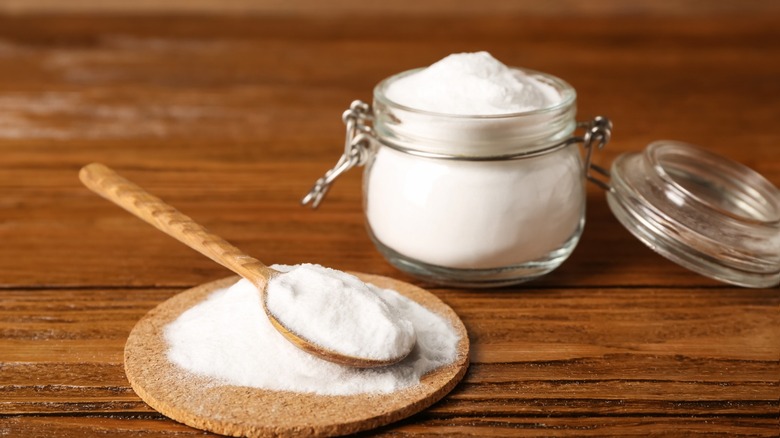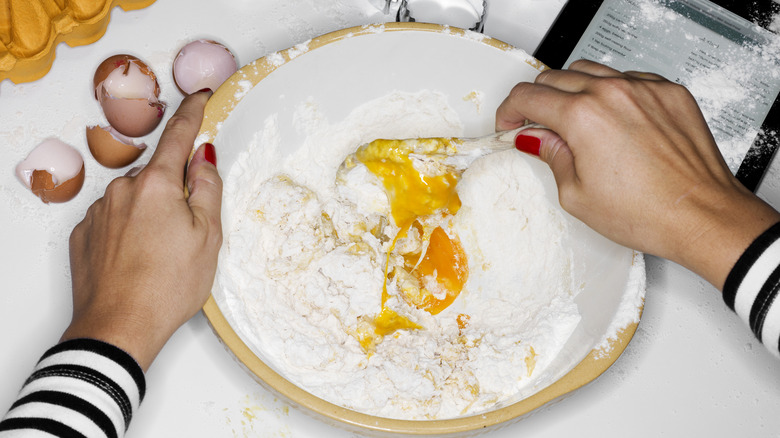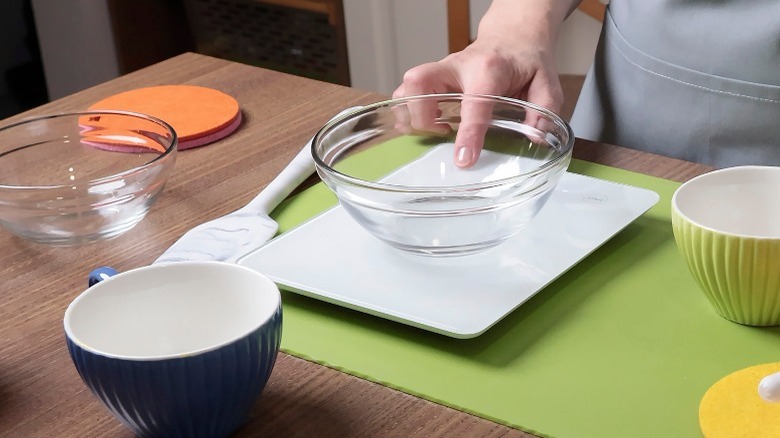What To Do If You Add Too Much Baking Soda To A Dish
We may receive a commission on purchases made from links.
As seemingly innocuous as it is, baking soda is a surprising source of vexation. It's forever confused with other white powder ingredients, with searches for substituting baking soda and baking powder saturating the internet. It also seems particularly conducive to spillage, given the way manufacturers provide for opening the packaging. And adding too much can potentially be a serious problem.
When we say that cooking is a science, that isn't just a platitude. It's chemistry, replete with all manner of chemical reactions, for good or for ill. Sodium bicarbonate, baking soda for short, is a leavening agent. It's intended to help baked goods rise. So the consequences of adding too much go further than matters of taste (though it does have its own sort of metallic saltiness), so improper measurements will change the composition of your finished product. Too much could cause your birthday cake to rise too much. But you could end up with more than just extra-fluffy cake. It could rise to the point of collapse, similar to the ingredient mistake that causes deflated cakes (namely expired baking soda).
But there are some ways you can prevent and practically remedy the dreaded baking soda excess. Of course, ultimately, the best thing to do is avoid using too much in the first place. But once you're in that situation, you may be able to change your circumstances by removing the offending excess or even increasing everything else to match.
Removing the excess baking soda
If you add too much baking soda, the most obvious fix is just to scoop it all out. If you can get most of it, you can remeasure with little worry about impacting your recipe. But that works best in cases when you've spilled it in a single area. Another option, if you can see it, is to use a damp finger like a magnet to attract stray baking soda. But this method may pick up other ingredients.
The next most common corrective is to double the recipe, but that, too, has its limitations. For one, you need to know how much extra you've spilled — an unlikely scenario unless it all came tumbling out of the box while you were weighing it. And while you can usually double ingredients for something as simple as chocolate chip cookies, other recipes are less forgiving and could yield unintended results.
There's also always the grandma approach. Many matriarchs eyeball their recipes rather than using the scales we love so much. So those comfort sweets might technically sometimes have a bit too much of this or too little of that. Now, this approach isn't going to work if you've totally overdone the baking soda, but a pinch more than you really need might turn out fine — in a pinch.
Avoid using excess baking soda
You will achieve more precise measurements by measuring your dry and wet ingredients the right way when baking, and the best way to do that is with a food scale. You can buy scales that can accommodate lighter-weight ingredients on Amazon. For example, the KitchenAid dual-platform kitchen scale has a wider surface to accommodate larger bowls and a miniature scale with increased sensitivity and microgram-specificity for low-volume ingredients like baking soda, baking powder, and salt. And if you measure every ingredient separately before putting it into the bowl, you always have a do-over.
For those who prefer volumetric measurements but still pride themselves on precision, this tip is going to seem highly controversial, but stick with it. Scoop, do not tap or pour, your baking soda (and obviously, never attempt the latter over your other ingredients). When you're measuring by volume, scooping can have an unwanted packing effect that itself adds too much of a given dry ingredient. But that effect is more pronounced in high-volume ingredients like flour. So you'll actually go over by less if you scoop small amounts than if you pour directly into the bowl and have an accident.
That said, if you've skipped this critical precaution, applied all possible extraction efforts, investigated the possibility of doubling the recipe, and still think the grandma rule would result in inedible goods, you still get an A for effort — and formal approval to toss it all and start over.


